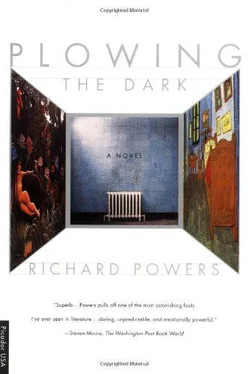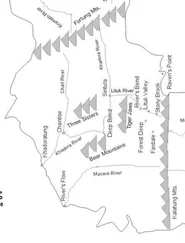They played like girls stumbling upon a rolltop desk in an attic, all the pigeonholes intact. Oil and Quilt; Paper Scrap and Tapestry; Putty Knife, Aluminum Foil, Fresco.
Agitated Cave Painting? What in creation…?
As in Lascaux. I named that one. That's one of mine.
Yours? Hang on a minute. You wrote…?
Sure. What'd you think? You think Ãò just some Turbo Pascal farm-team stringer?
Math does all this, Adie chanted. All some kind of— The greatest paint-by-numbers kit in the universe.
Princess, Ãò ready to love you, and all that. But you gotta pull it together a little, or we'll never manage to drag you over the finish line.
You mean there's more?
Always. "More" is what we do. "More" is this outfit's end product.
Always another level down, always another branch led off from the branch where they stood, until the spreading tree grew to fill all the available arbor. Submenu Art Effects. Submenu Filters. Submenu Artist Styles. Pointillism. Seurat. Their grafted leaves speckled into something from the Grande Jatte. The imitation was uncanny — an exact running average, stained on the mottled leaf, of every dot that the dead painter ever applied to canvas.
Oh Jesus. I cant believe this. God help me.
Sue dragged her stunned apprentice through a pantheon of styles. They tried on painters like teens trying on jeans at a factory outlet. Giotto bent the green into chalky sapphire chunks. The Caravaggio leaf darkened to tenebrismo. Van der Weyden glistened, hard-edged and luminous. Rothko bled a whole woodland of greens out of one monotone block. Artists who'd never dreamed of painting a leaf now did so in a perfect parody of their leafless life's work.
Adie stood still in the Cavern, straddling rapture and despair.
Who made all these things?
What do you mean who made them? We just did. Didnt you just see us?
No. I mean, who made the routines. Who made.. Rothko? Caravaggio?
Oh. Yeah. That was us too.
Us?
Us. Me, Acquerelli, Rajasundaran, Spiegel…
Spiegel? My Spiegel? Does every one of you know more about painting than I know about computers?
Watch this, Sue commanded. As if Adie could help but watch. Sue blinked onward, narrow and accurate. We can take a Rubens palette and put it on top ofPoussin shrubbery. Using Mary Cassatt's brushstrokes.
Don't. Please. You realize that what makes these people great is…?
That you cant reduce them to a statistical average? Yeah, yeah, we've looked into all that. But still, Sue wheedled. I bet you know who this is.
Adie did, at a glance. And the one after that was even more obvious. A little aura began to glow, just behind the globe of her left eye. The harbinger of an out-of-this-world migraine that would prostrate her for the next ten hours.
Gauguin, she called out. I need to see Gauguin.
Why? Guilty favorite or something? Was he so hot with foliage?
Adie didn't explain. Her need had nothing to do with the man's technique. She needed to see the colors behind that grimly named panorama, its name as long as the painting itself: Where Do We Come From? What Are We? Where Are We Going?
They did Gauguin, blessedly not all that convincing. I've seen better Gauguin imitations on cruise-line brochures.
Sue brayed. Tell me about it. We wrote this great filter. But we didnt know who in the hell it looked like.
Marc, Adie declared. Franz Marc.
You're the expert. Sue pulled up à Ñ shell and jiggled the label of the offending menu. Gauguin became Marc, even more easily than he had in real life.
You want to write a decent Gauguin? We can start with this one and monkey with the parameters.
You mean to tell me I can be anyone? That every conceivable style…? That everyone's hand in the history of Western…?
Princess. Chill. Whatever we can describe, we can reproduce.
They played out the remainder of their reserved time slot, until Sybil Stance's climate modeling group came and kicked them out. By the time Klarpol and Loque left the Cavern, their laurel had become the spitting image of that bouquet just behind the sofa in Rousseau's Dream. A bouquet that never existed, until they plucked it and placed it there.
The staff at school exudes a nervous optimism that no one will jinx by speaking. They give you the guided tour prepared for all new hires. They leave the school driver to orient you, although all parties tastefully avoid that verb.
"I take you anywhere, Mr. Martin. You tell me, I drive." He brings you down a newly broadened thoroughfare. On all sides of your closed car, life returns to trade. You pass the financial district and the open-air suqs, once more breathing with people. The anti-Ottoman statues in Martyrs' Square seem almost crater-free, from a distance. You hook around the Corniche along the Riviera, avoiding the checkpoints.
Here and there, steel girders tear loose from the sides of blasted buildings, dragging along sprays of concrete veil. Balconies crumble off high-rises like so many dried wasp nests. Freshly scrubbed laundry hangs from those that remain, blinding white flags flapping in the Levant sun.
Here is the Paris of the East, the once-chic orchid of the eastern Med. You speed along the shredded Rue des Banques to a palm-lined plaza, down by the turquoise bay. Fifteen minutes after setting out, the chauffeur spreads his hands in the air, palms up, disarmed. You see? Things are calming down. Returning to livable. "Where does that street lead? No, this one here." "Ha. Don't worry, Mr. Martin. Very boring. Very nothing." "Can we head down this way? I'd just like a quick peek." "Later, maybe. Inshallah." God willing. As if healing required hiding the wounds.
No matter; you see it already. The thing your friends back home saw, even before you left. The thing you've half wished away, half sought out. Just behind the ivory facing, just beneath the glinting amethyst, this world is still shelling itself down to rubble.
You can't help but hear it, rumbling off in the direction of the Metn foothills. A shell barrels overhead, close enough to break your guide's composure. This war is not over. This war will never end. Yet this rumble is no more than cartoon thunder. It growls like linen scraped over a plywood drum. The bursts come no closer to hurting you than score-board fireworks. They detonate impotently, softer than the explosions of your recent American bug-out.
In fact, living on a powder keg has much to recommend it, providing one's driver knows a safe way back to the impregnable compound. A city's self-inflicted scars offer the prospect of unlimited further diversions.
The following week treats you to your first real teeth-rattling blast. The panic passes, leaving you more alive than you've felt in months. An artillery plume rises on the horizon — an old movie's Indian smoke signals. Your life is not yet over, whatever the last two years have insisted. Thirty-three is still young. The future remains your dominant tense. You're alive, unhit. Anything can still happen.
Simply being here proves that. You couldn't have scripted such a trip. Six years in Chicago, explaining your inexplicable country to Japanese businessmen, riding the emotional Tilt-a-Whirl with a miserable woman, keeping body and soul together on a largely ceremonial salary. Now living like a sultan, on hazard pay, in a place even more desperate than that woman.
There is a harsh humor to it: nailing the job interview because of your Muslim mother. Because you don't currently drink, no matter the historical reason. Because they mistake you for one who understands the Faithful. Because tenacious Lebanese need the same English your Japanese businessmen did.
Читать дальше












